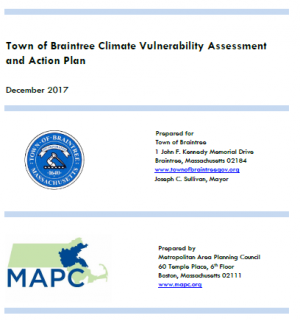December 2017 Climate Vulnerability Assessment and Action Plan
Prepared for the Town of Braintree by the Metropolitan Area Planning Council
The devastating effects of Hurricanes Harvey, Irma, and Maria highlight the imperative to plan now for future storms. As detailed in the Climate Change Background section of this report, we are already experiencing warmer temperatures, increased precipitation, and rising seas. Precipitation in the Boston area has increased by 10% in the past fifty years. Recently released design storm figures (NOAA 14) for the 10-year, 24-hour storm are 15% higher than those issued in 1961. Climate projections for this century include increased frequency and intensity of rain storms, rising seas, and more frequent days with extreme heat.
The March 2010 rains caused millions of dollars in damages in Braintree. As rainfall amounts increase, rain events similar to 2010 will become more frequent. A one-thousand year event would nearly double the rainfall experienced over three days in March 2010. As is evident from the recent hurricanes, damage and suffering from such an extreme event is inevitable. Indeed, flooding or extreme heat, and the resultant potential for power outages can have severe and cascading effects during far lesser storms than a one-in-one-thousand year occurrence.
Yet we can take steps to increase community resilience and limit future damages. Many of today’s municipal investments and decisions have long legacies that will influence future vulnerabilities. Advance planning can save money, while inaction, or actions that don’t anticipate future conditions, may lead to higher costs in the future. An example of effective planning comes from the reports that Florida properties experienced much less damage from Hurricane Irma than from Hurricane Andrew in 1992. This is attributed to critical improvements made to the building code as a result of lessons learned from Hurricane Andrew. This report identifies future climate vulnerabilities and suggests strategies that can reduce the risk of harm to people and properties, and help speed recovery when inevitable future storms occur.
Project Manager/Senior Environmental Planner
Anne Herbst
Regional Planner
Genea Foster
GIS/Data Analysis
Eliza Wallace
Ryan Melendez
Emily Long
Acknowledgements
The project was conducted by the Metropolitan Area Planning Council (MAPC) with funding from MAPC’s Planning for MetroFuture Technical Assistance program, the Barr Foundation, the Commonwealth of Massachusetts Community Compact and District Local Technical Assistance programs, and the Town of Braintree.
Town of Braintree:
- Mayor Joseph C. Sullivan
- Project Manager/Conservation Planner Kelly Phelan
Steering Committee Members: James Arsenault, Sharmila Biswas, Bob Campbell, Lou Dutton, Michael Cavanaugh, Mary Beth McGrath, David McKenna, Sean Murphy, Stephen O’Brien, Kelly Phalen, Christine Stickney, Mark Thompson

